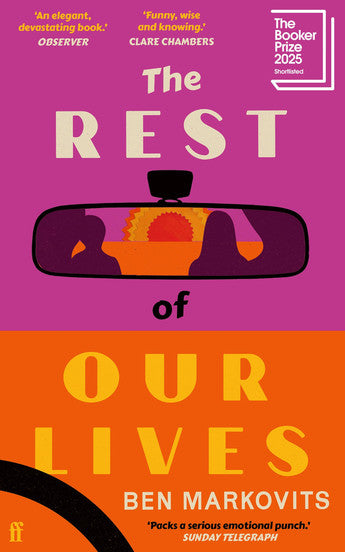Ben Markovits
The Rest Of Our Lives
The Rest Of Our Lives
Couldn't load pickup availability
The appearance of Ben Markovits' twelfth novel The Rest Of Our Lives on the Booker Prize shortlist seems to have caught a lot of people by surprise, including all of us at The Lane. Markovits is a respected author but not a 'name', and unlike some recent winners, The Rest Of Our Lives doesn't play with form, push the boundaries of literature or capture the zeitgeist. It is simply a well-told story.
It begins as Tom Layward, a 55-year-old law professor, prepares to take his youngest child, Miri, to university: a pivotal moment for any parent. Tom tells us at the outset of the novel about his wife Amy’s affair a decade earlier, and how he had dealt with this by vowing to leave the marriage when Miri left home. His decision is the earthquake that shatters his foundations and leaves his future swirling in mid-air. His response is to drive Miri to university and then to keep going: to visit old friends, his brother, an old girlfriend, and eventually his son, Michael, who "had become one of those young people who decides that contact with their family is not a source of happiness, so you have to limit any it to unavoidable occasions."
Throughout his meanderings, Tom talks directly to the reader, confessing his misgivings about his marriage, his career, his life and his decision to take to the road. We learn that he is being phased out from his position at the university, his views out of sync with the faculty and the students. In Tom’s characteristically understated manner, he explains: "You reach a certain age and realize, the things you used to take for granted, that everybody you knew and liked agreed on, nobody agrees with you anymore about those things.”
While his manner is understated, Tom’s view of life verges on the misanthropic. His comments about Amy can seem particularly bitter but his anger is directed as much towards his listlessness as towards her: "When I listened to her talk it was a gentle reminder of what her personality used to be like, before being slowly eroded by long association with me.” The fractures in his self-worth and their relationship leaves Tom talking to Amy in his head but unwilling to answer her phone calls, for fear that "the person you talk to will not be person in your head.”
It's clear that Tom is undergoing a crisis of confidence – "the heavy tread of middle age on the family stairs" – as well as conviction. Loneliness also plays its part. As with so many men of his age, career, family, geography and a lack of attention have left Tom isolated. While visiting Sam, an old friend from college, the two talk around the edges of their lives, unable to cross the bridge back to the closeness they had: "[B]ut there was also a feeling like, something intimate was on the edge of the conversation, like, waiting to get in, which maybe in the past we might have let in, but the party was over now."
The Guardian compared The Rest Of Our Lives to Miranda July's uproarious All Fours, both books “focusing on the difficult middle passage in the life of its protagonist.” I doubt, however, that Ben Markovits will prompt readers to upend their own lives in the way that Miranda July reportedly did. Tom’s road trip is far more melancholic, far more lackadaisical, than that of the unnamed protagonist of All Fours. There is little joy to be found in his travels, and certainly a great deal less sex. For me, The Rest Of Our Lives sits alongside the books of Anne Tyler and Elizabeth Strout, sharing their detailed observations of the small moments and interactions that gradually define lives. The wit is dry and underplayed, and revelations come slowly to the characters. It's a book you could fly through in a couple of sittings and consider a good story, but otherwise unremarkable. Halfway through, I was thinking just that. Then I looked a little closer and found more to consider: about how our we care for our lives, or don't; how we care for our relationships, or don't. I would be surprised if Markovits wins the Booker, but I wouldn't be at all surprised if The Rest Of Our Lives provides a slow revelation for many readers. Maybe it did just that for the judges.
OBSERVER (Fiction to look out for in '25)
Share


